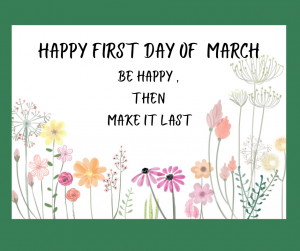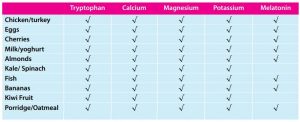Welcome to March’s Blog.
Not long now to Spring, 20th March and I’m looking forward to it. Hopefully you are keeping well and have fared well with the weather we have had recently. As our weather improves and evenings are lighter we can start to enjoy getting out and about more.
This month I wanted to share with you the following article of how some of the foods we eat can effect our sleep. We know how important sleep is to us and should anything in our lives not be quite as we want it to be, it can be the first and main thing to be affected.
Eat Your Way to Better Sleep – by Janet Adams a fellow Solution Focused Hypnotherapist.
Are you looking to lose weight, have you fully embraced the power of sleep in attaining your goals? If you are struggling with sleepless nights are you gaining weight? Are there foods that people with chronic pain can be mindful of? I/We are not dieticians or nutritionists, but knowing some background can help.
How Poor Sleep Can Impede Weight Loss
- Regularly sleeping less than 7 hours a night means we have more of a tendency to put on weight and increase our chances of becoming obese.
- Poor sleep makes it harder to make wise decisions when it comes to food choices. We’re more likely to give in to cravings for unhealthy food.
- Lack of sleep increases cortisol levels in our body, leading to weight gain (particularly belly fat) and more cravings.
- The more fat we have, the more appetite-regulating leptin we produce, but it’s less effective. This unbalances the relationship between leptin and ghrelin (the ‘hunger hormone’), and your appetite increases.
How Diet Can Impact Sleep

- Gut Brain Axis – our stomachs and brains are connected. The more unbalanced our gut brain microorganisms etc are, the harder it is for our central nervous system to cope with stress, and the more difficult it is to sleep. What helps? Fermented foods, olive oil, probiotics and omega 3’s (the Mediterranean diet).
- Carbohydrates – High amounts of ‘carbs’ do make us sleepy. But if we eat them late at night chances are that we can wake up more often, and not get enough deep sleep. This restricts our body’s time to recharge and re-energise, boost the immune system, recover and repair. A moderate amount of unrefined carbs helps us sleep. They stimulate insulin, which clears the way for tryptophan to reach the brain and help us produce serotonin.
- Protein – Too much protein in the evening or at night, because it’s hard to digest, stimulates the brain and lowers our ability to sleep – it also reduces the quality of our sleep when we do nod off. Better deep sleep is good for muscle growth, so if, for example, you are working out, less protein later in the day might actually give you better results as well as aid sleep.
- Fat, sugar, salt – Vegetable cooking oils, processed meats, cakes etc can worsen inflammation in the body. Chronic inflammation, for example fibromyalgia, can be too painful to sleep through. REM sleep produces pain-relieving endorphins. Less fat, sugar and salt = less pain.
Foods to Aid Sleep
There is a very simple way to break down how some foods aid sleep.
The Five Steps
- Tryptophan, an amino acid, helps us make serotonin. We can only get tryptophan by eating or drinking certain foods.
- Calcium helps process tryptophan (and melatonin which signals the body to sleep). Magnesium boosts serotonin and potassium regulates it, helping us stay asleep.
- We use serotonin to make melatonin.
- We can also eat foods containing melatonin.
- Melatonin controls our sleep cycles
Here’s a list of some foods with most or all those vital ingredients in varying degrees
It’s also worth bearing in mind not to eat a few hours before bed – this will give the body time to get the benefits of sleep-inducing foods and avoid heartburn/acid reflux. Research also suggests that it might be best to have our largest meal in the morning.
The Take Away
Solution Focused Hypnotherapy can help improve:
- Sleep
- The ability to focus on long term goals, eg weight loss, not short-term rewards.
- The ability to make healthier lifestyle choices.
It can be useful to have an awareness of how our diets can influence our sleep patterns however some people have certain health conditions or take medications that mean certain foods should be avoided therefore I’d recommend that you discuss it with your GP or a qualified dietician or nutritionist.
Further Reading
Ian Taverner lives with fibromyalgia and approaches dealing with chronic pain with a mindset of maximizing what you can achieve, boosting your overall wellbeing, and embodying how nutrition, mindset, action and mental health can be optimized (you can find him on Facebook, Instagram). I also recommend Laurann O’Reilly’s blogs on her Nutrition by Laurann (https:// nutritionbylaurann.ie).
Enjoy March, stay safe
Best Wishes
Louise
